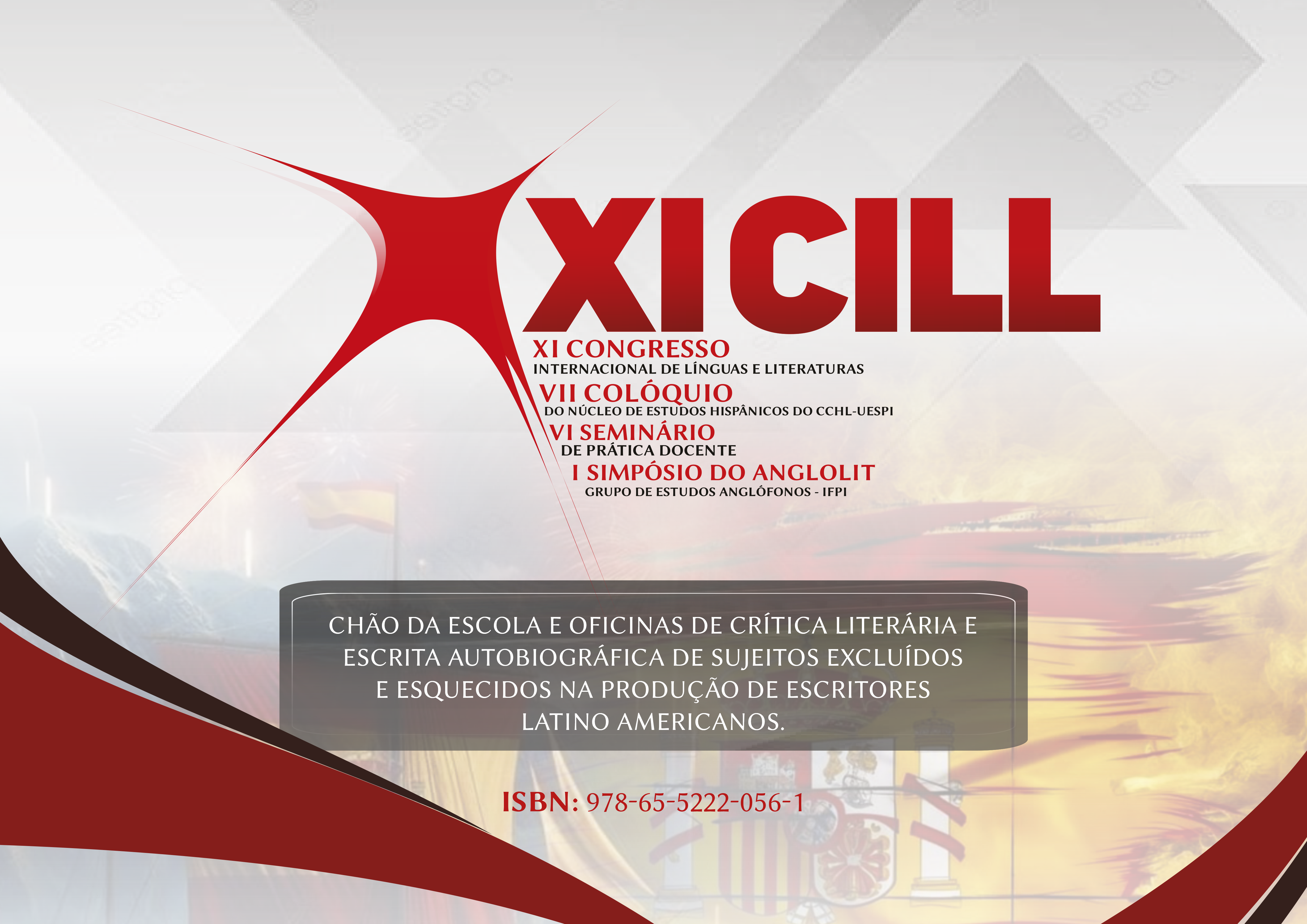NAMECRAFT, METAPHOR, AND CYBERPUNK STYLISTICS IN THE BRAZILIAN TRANSLATION OF NEAL STEPHENSON’S SNOW CRASH
"2025-09-15" // app/Providers/../Base/Publico/Artigo/resources/show_includes/info_artigo.blade.php
App\Base\Administrativo\Model\Artigo {#1845 // app/Providers/../Base/Publico/Artigo/resources/show_includes/info_artigo.blade.php #connection: "mysql" +table: "artigo" #primaryKey: "id" #keyType: "int" +incrementing: true #with: [] #withCount: [] +preventsLazyLoading: false #perPage: 15 +exists: true +wasRecentlyCreated: false #escapeWhenCastingToString: false #attributes: array:35 [ "id" => 123191 "edicao_id" => 429 "trabalho_id" => 136 "inscrito_id" => 329 "titulo" => "NAMECRAFT, METAPHOR, AND CYBERPUNK STYLISTICS IN THE BRAZILIAN TRANSLATION OF NEAL STEPHENSON’S SNOW CRASH" "resumo" => "This paper examines how stylistic textures are reconfigured when Snow Crash (1992) is rendered into Brazilian Portuguese (2015). Anchored in literary stylistics and translation studies, the study concentrates on three interlocking phenomena: namecraft, metaphor, and cyberpunk genre conventions. A close comparative reading isolates invented and adapted namecraft, metaphorical networks around language as virus, and the novel’s playful, idiomatic, and slang-rich narration. Analytical tools drawn from schema theory and the loaded-name framework reveal that Stephenson’s hyperbolic satire depends on disrupting readers’ schematic expectations, whereas the translation largely neutralises these cues through literal copying or omission. The rendering of the novel into Portuguese, particularly at the levels of neosemy and wordplay, lacks the inventiveness found in the source text and therefore attenuates humour, social critique, and immersive world-building. The findings underscore the need for compensatory strategies such as creative pun recreation, culturally proximate neologisms, and rhythm-preserving syntax when translating speculative fiction into languages with fewer phonological and lexical affinities to English. By foregrounding stylistic losses and discussing targeted solutions, the article contributes to the growing body of work on the cognitive and cultural stakes of translating Anglophone science fiction for Lusophone readers." "modalidade" => "Comunicação Oral (CO)" "area_tematica" => "ST 05 - EXPLORING THE LANGUAGE OF SPECULATIVE FICTION" "palavra_chave" => ", , , , " "idioma" => "Português" "arquivo" => "TRABALHO__EV228_ID329_TB136_15072025190135.pdf" "created_at" => "2025-09-05 10:38:33" "updated_at" => null "ativo" => 1 "autor_nome" => "ADEMAR PEREIRA SOARES JÚNIOR" "autor_nome_curto" => "Ademar SoaresJr" "autor_email" => "ademarpjunior@gmail.com" "autor_ies" => "INSTITUTO FEDERAL DE EDUCAÇÃO, CIÊNCIA E TECNOLOGIA DO PIAUÍ (IFPI)" "autor_imagem" => "" "edicao_url" => "anais-do-xi-congresso-internacional-de-linguas-e-literatura" "edicao_nome" => "Anais do XI Congresso Internacional de Línguas e Literatura" "edicao_evento" => """ XI CONGRESSO INTERNACIONAL DE LÍNGUAS E LITERATURAS \r\n XI CONGRESSO INTERNACIONAL DE LÍNGUAS E LITERATURAS / VII COLÓQUIO DO NÚCLEO DE ESTUDOS HISPÂNICOS DO CCHL-UESPI / VI SEMINÁRIO DE PRÁTICA DOCENTE / I SIMPÓSIO DO ANGLOLIT """ "edicao_ano" => 2025 "edicao_pasta" => "anais/linguas/2025" "edicao_logo" => null "edicao_capa" => "68c8502a1c10e_15092025144306.png" "data_publicacao" => "2025-09-15" "edicao_publicada_em" => "2025-09-03 09:22:34" "publicacao_id" => 81 "publicacao_nome" => "Revista do Congresso Internacional de Linguas e Literatura" "publicacao_codigo" => "978-65-86901-40-5" "tipo_codigo_id" => 2 "tipo_codigo_nome" => "ISBN" "tipo_publicacao_id" => 1 "tipo_publicacao_nome" => "ANAIS de Evento" ] #original: array:35 [ "id" => 123191 "edicao_id" => 429 "trabalho_id" => 136 "inscrito_id" => 329 "titulo" => "NAMECRAFT, METAPHOR, AND CYBERPUNK STYLISTICS IN THE BRAZILIAN TRANSLATION OF NEAL STEPHENSON’S SNOW CRASH" "resumo" => "This paper examines how stylistic textures are reconfigured when Snow Crash (1992) is rendered into Brazilian Portuguese (2015). Anchored in literary stylistics and translation studies, the study concentrates on three interlocking phenomena: namecraft, metaphor, and cyberpunk genre conventions. A close comparative reading isolates invented and adapted namecraft, metaphorical networks around language as virus, and the novel’s playful, idiomatic, and slang-rich narration. Analytical tools drawn from schema theory and the loaded-name framework reveal that Stephenson’s hyperbolic satire depends on disrupting readers’ schematic expectations, whereas the translation largely neutralises these cues through literal copying or omission. The rendering of the novel into Portuguese, particularly at the levels of neosemy and wordplay, lacks the inventiveness found in the source text and therefore attenuates humour, social critique, and immersive world-building. The findings underscore the need for compensatory strategies such as creative pun recreation, culturally proximate neologisms, and rhythm-preserving syntax when translating speculative fiction into languages with fewer phonological and lexical affinities to English. By foregrounding stylistic losses and discussing targeted solutions, the article contributes to the growing body of work on the cognitive and cultural stakes of translating Anglophone science fiction for Lusophone readers." "modalidade" => "Comunicação Oral (CO)" "area_tematica" => "ST 05 - EXPLORING THE LANGUAGE OF SPECULATIVE FICTION" "palavra_chave" => ", , , , " "idioma" => "Português" "arquivo" => "TRABALHO__EV228_ID329_TB136_15072025190135.pdf" "created_at" => "2025-09-05 10:38:33" "updated_at" => null "ativo" => 1 "autor_nome" => "ADEMAR PEREIRA SOARES JÚNIOR" "autor_nome_curto" => "Ademar SoaresJr" "autor_email" => "ademarpjunior@gmail.com" "autor_ies" => "INSTITUTO FEDERAL DE EDUCAÇÃO, CIÊNCIA E TECNOLOGIA DO PIAUÍ (IFPI)" "autor_imagem" => "" "edicao_url" => "anais-do-xi-congresso-internacional-de-linguas-e-literatura" "edicao_nome" => "Anais do XI Congresso Internacional de Línguas e Literatura" "edicao_evento" => """ XI CONGRESSO INTERNACIONAL DE LÍNGUAS E LITERATURAS \r\n XI CONGRESSO INTERNACIONAL DE LÍNGUAS E LITERATURAS / VII COLÓQUIO DO NÚCLEO DE ESTUDOS HISPÂNICOS DO CCHL-UESPI / VI SEMINÁRIO DE PRÁTICA DOCENTE / I SIMPÓSIO DO ANGLOLIT """ "edicao_ano" => 2025 "edicao_pasta" => "anais/linguas/2025" "edicao_logo" => null "edicao_capa" => "68c8502a1c10e_15092025144306.png" "data_publicacao" => "2025-09-15" "edicao_publicada_em" => "2025-09-03 09:22:34" "publicacao_id" => 81 "publicacao_nome" => "Revista do Congresso Internacional de Linguas e Literatura" "publicacao_codigo" => "978-65-86901-40-5" "tipo_codigo_id" => 2 "tipo_codigo_nome" => "ISBN" "tipo_publicacao_id" => 1 "tipo_publicacao_nome" => "ANAIS de Evento" ] #changes: [] #casts: array:14 [ "id" => "integer" "edicao_id" => "integer" "trabalho_id" => "integer" "inscrito_id" => "integer" "titulo" => "string" "resumo" => "string" "modalidade" => "string" "area_tematica" => "string" "palavra_chave" => "string" "idioma" => "string" "arquivo" => "string" "created_at" => "datetime" "updated_at" => "datetime" "ativo" => "boolean" ] #classCastCache: [] #attributeCastCache: [] #dates: [] #dateFormat: null #appends: [] #dispatchesEvents: [] #observables: [] #relations: [] #touches: [] +timestamps: false #hidden: [] #visible: [] +fillable: array:13 [ 0 => "edicao_id" 1 => "trabalho_id" 2 => "inscrito_id" 3 => "titulo" 4 => "resumo" 5 => "modalidade" 6 => "area_tematica" 7 => "palavra_chave" 8 => "idioma" 9 => "arquivo" 10 => "created_at" 11 => "updated_at" 12 => "ativo" ] #guarded: array:1 [ 0 => "*" ] }



